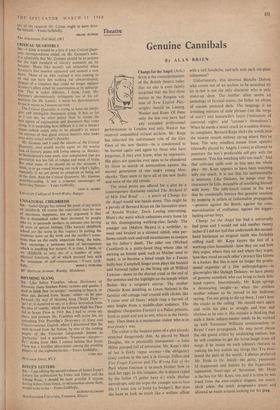CRITICAL QUARTERLY
SIR--1 think it would be a pity if your Critical Quar- terly correspondence ended on Mr. Gomme's note. It is admirable that Mr. Gomme should be so zealous for the high standard of literary comment set by Scrutiny. Many (like myself) can remember when Scrutiny's first number appeared and seemed a new dawn. Those of us who realised it was coming to an end can have felt nothing but almost-despair, despair of a situation that could no longer support Scrutiny's effort either by contribution or by subscrip- tion. That is rather different, I think, from Mr. Gomme's unconsciously delinquent use of his ad- miration for Dr. Leavis : I mean his determination to use le ',deux as l'ennemi du hien.
The Critical Quarterly is trying to keep an intelli- gent and intelligible discussion going. It has, as far as I can see, no other policy than to accept the best agents of explanation and discussion that come along. It is surprising how difficult it is for a literary organ (which exists only to he played!) to secure the services of that ghost critical maestro who looks over every actual writer's shoulder.
Mr. Gomme and I (and the editors of the Critical Quarterly, too) would maybe agree on the woeful lack of literary giants still living among us. Hooker, in Shakespeare's time even, also complained that his generation was too full of tongue and weak of brain. But what none of us should do at the moment, I think, is to go round blowing out each other's lights; especially if we are prone to complain of being left in the dark. And the Critical Quarterly, Mr. Gomme notwithstanding, is not a criminal encourager of latter-day Dunces.—Yours faithfully,










































 Previous page
Previous page